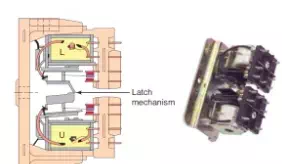How does Relay work? Types of relays
Relays are an electronic component that can implement switching logic. Relay is a device that uses electromagnetic forces to close (or open) the switch contacts. The Relay is an electronic component in the form of an electronic switch that is driven by an electric current
Working of relay:
The relay consists of coil and contact. Look at the picture above, the coil is a coil of wire that gets an electric current, while the contact is a kind of switch whose movement depends on the presence or absence of electric current in the coil

There are 2 types of contact:
· Normally Open (initial condition before it is activated open)
· Normally Closed (initial condition before activating close)
In the working principle of the relay: when the Coil gets electrical energy (energized), an electromagnetic force will arise which will attract a springing armature, and the contact will close
Types of Relays:
The relays are distinguished by the pole and throw it has.
· Pole: the number of contacts that the relay has
· Throw: the number of states that contact may have
The following is a relay classification based on the number of poles and throws:

· DPST (Double Pole Single Throw)
· SPST (Single Pole Single Throw)
· SPDT (Single Pole Double Throw)
· DPDT (Double Pole Double Throw)
· 3PDT (Three Pole Double Throw)
· 4PDT (Four Pole Double Throw)
Timing relay:

Timing relay is a special kind of relay. The way it works is as follows: if the coil from the relay ON timing, then a few seconds later, the new contact relay will be ON or OFF (according to the type of NO / NC contact).
Latching relay:

A latching relay is a type of relay used for latching or maintaining active input conditions even if the input is actually dead. The way it works is as follows: if latch coil is activated, it will not be disabled unless the unlatch coil is activated. Symbol of latching relay.